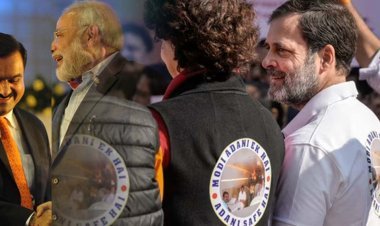BJP's Gandhi Dilemma: How To Use the ‘Brand’ While Destroying Its Spirit

Ram Puniyani :
As we celebrated the birth anniversary of the father of the nation on October 2 this year, we do need to look back at his teachings and the prevailing situation in the country. His global recognition was manifested when the leaders from different countries assembled on Raj Ghat to pay tribute to him in the aftermath of the G-20 summit in New Delhi. That even those who subscribe to the ideology which put three bullets into his chest could not ignore him was more than obvious. While the ideology Gandhi propounded is spreading all over the world, what is happening to the concepts of truth, non-violence, communal harmony and the idea of formulating policies with the ‘last person’ in mind in India today?
The present dominant ideology in India sees Islam and Christianity as foreign religions. This understanding is one of the foundations of hate against minorities and leads to violence against them. How did Gandhi see the presence of different religions in India? He writes, “Certainly the great faiths held by the people of India are adequate for her people.” He then goes on to list the faiths of India, “Apart from Christianity and Judaism, Hinduism and its offshoots, Islam and Zoroastrianism are living faiths.”
The prevalent dominant ideology presents all the ills of Hindu society as a result of the oppression of Muslim. Gandhi saw history in a totally different light.
“The Hindus flourished under Moslem sovereigns and Moslems under the Hindu. Each party recognized that mutual fighting was suicidal, and that neither party would abandon its religion by force of arms. Both parties, therefore, decided to live in peace. With the English advent quarrels recommenced…Is the God of the Mohammedan different from the God of the Hindu? Religions are different roads converging to the same point. What does it matter that we take different roads so long as we reach the same goal? Wherein is the cause of quarrelling?”
A lot is made of conversion to Islam and Christianity, scattered but serious anti-Christian violence is ascendant. What did Gandhi think of conversions?
“The Two races (Hindus and Muslims) lived at peace amongst themselves during Muslim rule. Let it be remembered that many Hindus embraced Islam before the advent of Muslim rule in India. It is my belief that had there been no Muslim rule, there would still have been Musalmans in India, even as there would have been Christians had there been no British rule. There is nothing to prove that the Hindus and Musalmans lived at war with one another before British rule.”
His great disciple Nehru in his book The Discovery of India points out about India:
“She was like some ancient palimpsest on which layer upon layer of thought and reverie had been inscribed, and yet no succeeding layer had completely hidden or erased what had been written previously.”
Hate is being spread against Gandhi in an intense manner. Through word of mouth and other systematic channels, propaganda is spread that Gandhi did not prevent the hanging of Bhagat Singh. The truth is that Gandhi wrote two letters to Lord Irwin seeking the death sentence to be commuted to life imprisonment or seeking a suspension of the death sentence. Lord Irwin was considering Gandhi’s request but was threatened by British officers working in Punjab of resignation en masse. One should recall that it was Gandhi who drafted the resolution in the Karachi Congress of 1931, criticising the government for Bhagat Singh’s hanging.
They also spread the lie that Gandhi treated Subhas Chandra Bose very badly. The truth is that though there were differences in their approach towards non-violence and driving the British away in the wake of the Second World War, they had great mutual respect. Bose called Gandhi as the ‘Father of the Nation’, and named the first battalion of the Azad Hind Fauz (AHF) after the Mahatma. Gandhi on his part called Bose a ‘Prince amongst patriots’ and paid a visit to the officers of the AHF in jail. It was the Congress which fought the cases of the AHF prisoners.
A similar controversy has been magnified about differences with Babasaheb Ambedkar. While Babasaheb was asking for separate electorates for the Scheduled Castes, Gandhi was for reserved constituencies. This was to keep the society united in the face of the anti-colonial struggle. Babasaheb did recognise Gandhi as the tallest leader of the freedom movement and after his second marriage, an inter-caste one, stated that had Gandhi been alive, he would have been happy. It was Gandhi who ensured that Ambedkar was part of the first cabinet of India and also suggested that Ambedkar should be the chairman of the Drafting Committee of the Indian constitution.
As far as the controversy over who should be the first prime minister of India – Sardar Patel or Nehru, Gandhi did favour the latter. It should be noted that Nehru and Patel were Gandhi’s two closest associates. He favoured Nehru mostly for his grasp of global politics. There may be other unstated factors – like Nehru being the most popular leader among the masses after Gandhi, and as the younger leader, could play a role in the growth of the nation for a longer time. These are just guesses – as far as Patel and Nehru were concerned, they were totally in sync with each other, irrespective of a few differences. Patel said of Nehru that he was not only his younger brother but also his leader.
In today’s scenario, the country needs to reexamine the dangerous path of hate which is stalking the streets. It was Gandhi’s ‘Ishwar, Allah Tero Naam’ which kept all religious communities together in the anti-colonial struggle. Following his message of social reform, struggle against the caste system, and unity across religious lines is the need of the hour. That will be our best tribute to him.

















